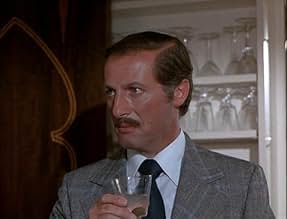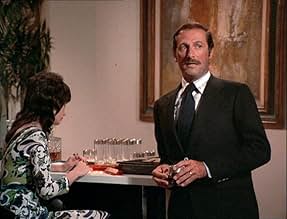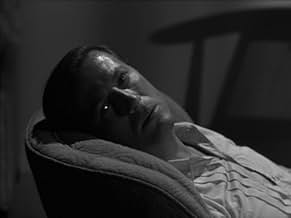Lloyd Bochner(1924-2005)
- Actor
Lloyd Bochner had that wonderfully sonorous type of voice that
was always tailor-made for radio or for the stage. Unsurprisingly then,
by the time he was eleven, Lloyd was already employed as part-time
voiceover artist and reader of drama serials by radio stations in
Vancouver.
Lloyd Wolfe Bochner was born in Toronto, Ontario, Canada, to Frieda (Kenen) and Charles Abraham Bochner. He was of Russian Jewish and Ukrainian Jewish descent. He made his acting debut as a youth with the Joseph Barrington Juveniles. Lloyd's education at the University of Toronto was interrupted in 1943 by wartime service in the Royal Canadian Navy. However, in 1947, he graduated with a B.A. and a few years later moved to New York to further hone his acting skills. In 1953, he returned to Canada to participate in the inaugural season of the Stratford Festival getting to enact choice Shakespearean roles from Horatio in "Hamlet" to Orsino in "Twelfth Night".
Having made his screen bow in a small Canadian production, The Mapleville Story (1946), Lloyd's first significant exposure in television was as British army officer Nicholas Lacey in the half-hour NBC serial One Man's Family (1949), which had first been performed on radio and starred Bert Lytell and Marjorie Gateson. His real breakthrough came quite a few years later, once having moved to Hollywood, as co-star of the studio-bound crime series Hong Kong (1960). He played local British police-chief Neil Campbell, solving crime in tandem with an American newspaper correspondent (played by Australian actor Rod Taylor). This, in turn, led to other key roles including his almost legendary appearance in the classic Miền Ảo Ảnh (1959) episode "To Serve Man" in 1962 (at one time voted 11th in a TV guide poll of 100 best TV episodes of all time). Based on a short story by Damon Knight written in 1950, "To Serve Man" unfolds in flashback as narrated for the viewer by Lloyd's decoding expert Michael Chambers. It has all the elements of great television, with an excellent cast (including Richard Kiel, later known as 'Jaws' from the 'James Bond' movies; and Theodore Marcuse as Citizen Grigori giving an indelible impression of Nikita Khrushchev); and an unexpected and disturbing denouement when it turns out that the supposedly altruistic alien Kanamits have come to earth to harvest humans for food. Lloyd repeated his famous punch-line, "it's a cook book!", years later as a spoof in Leslie Nielsen's Họng Súng Vô Hình 2: Nếm Trải Nỗi Sợ (1991).
For most of the 1960s and 1970s, Lloyd was cast in supporting roles, often as mellifluous, meticulously-attired, upper-class snobs, practically guaranteed to harbour treacherous intent. He appeared in several motion pictures, notably as the malicious, smooth villain Frederick Carter who unsuccessfully tangles with Lee Marvin in Sứ Mệnh Tuyệt Mật (1967), and in the same year, as homosexual drug dealer Vic Rood on the receiving end of the beating from Frank Sinatra in Tony Rome (1967). However, on the whole, Lloyd's preferred medium was television. He had a recurring role in the long-running soap-opera Dynasty (1981) as Blake Carrington's manipulative rival, Cecil Colby, in league with archvillain Alexis Carrington (Joan Collins). A versatile character actor, Lloyd's clean-cut, aquiline features and quiet air of authority lent themselves to portraying a vast gallery of medical men, soldiers, politicians and executives. Some of these were men of integrity, but like many a good actor, Lloyd rather enjoyed the challenge of playing the scoundrel.
During his half century-long acting career, Lloyd Bochner garnered two Liberty Awards as best television actor, Canada's equivalent of the Emmy Awards. He was also an active member in the Association of Canadian Radio and Television Artists. He died at age 81 of cancer on October 29, 2005 in Santa Monica, California. His children are actors Hart Bochner, Paul Bochner, and Johanna Courtleigh.
Lloyd Wolfe Bochner was born in Toronto, Ontario, Canada, to Frieda (Kenen) and Charles Abraham Bochner. He was of Russian Jewish and Ukrainian Jewish descent. He made his acting debut as a youth with the Joseph Barrington Juveniles. Lloyd's education at the University of Toronto was interrupted in 1943 by wartime service in the Royal Canadian Navy. However, in 1947, he graduated with a B.A. and a few years later moved to New York to further hone his acting skills. In 1953, he returned to Canada to participate in the inaugural season of the Stratford Festival getting to enact choice Shakespearean roles from Horatio in "Hamlet" to Orsino in "Twelfth Night".
Having made his screen bow in a small Canadian production, The Mapleville Story (1946), Lloyd's first significant exposure in television was as British army officer Nicholas Lacey in the half-hour NBC serial One Man's Family (1949), which had first been performed on radio and starred Bert Lytell and Marjorie Gateson. His real breakthrough came quite a few years later, once having moved to Hollywood, as co-star of the studio-bound crime series Hong Kong (1960). He played local British police-chief Neil Campbell, solving crime in tandem with an American newspaper correspondent (played by Australian actor Rod Taylor). This, in turn, led to other key roles including his almost legendary appearance in the classic Miền Ảo Ảnh (1959) episode "To Serve Man" in 1962 (at one time voted 11th in a TV guide poll of 100 best TV episodes of all time). Based on a short story by Damon Knight written in 1950, "To Serve Man" unfolds in flashback as narrated for the viewer by Lloyd's decoding expert Michael Chambers. It has all the elements of great television, with an excellent cast (including Richard Kiel, later known as 'Jaws' from the 'James Bond' movies; and Theodore Marcuse as Citizen Grigori giving an indelible impression of Nikita Khrushchev); and an unexpected and disturbing denouement when it turns out that the supposedly altruistic alien Kanamits have come to earth to harvest humans for food. Lloyd repeated his famous punch-line, "it's a cook book!", years later as a spoof in Leslie Nielsen's Họng Súng Vô Hình 2: Nếm Trải Nỗi Sợ (1991).
For most of the 1960s and 1970s, Lloyd was cast in supporting roles, often as mellifluous, meticulously-attired, upper-class snobs, practically guaranteed to harbour treacherous intent. He appeared in several motion pictures, notably as the malicious, smooth villain Frederick Carter who unsuccessfully tangles with Lee Marvin in Sứ Mệnh Tuyệt Mật (1967), and in the same year, as homosexual drug dealer Vic Rood on the receiving end of the beating from Frank Sinatra in Tony Rome (1967). However, on the whole, Lloyd's preferred medium was television. He had a recurring role in the long-running soap-opera Dynasty (1981) as Blake Carrington's manipulative rival, Cecil Colby, in league with archvillain Alexis Carrington (Joan Collins). A versatile character actor, Lloyd's clean-cut, aquiline features and quiet air of authority lent themselves to portraying a vast gallery of medical men, soldiers, politicians and executives. Some of these were men of integrity, but like many a good actor, Lloyd rather enjoyed the challenge of playing the scoundrel.
During his half century-long acting career, Lloyd Bochner garnered two Liberty Awards as best television actor, Canada's equivalent of the Emmy Awards. He was also an active member in the Association of Canadian Radio and Television Artists. He died at age 81 of cancer on October 29, 2005 in Santa Monica, California. His children are actors Hart Bochner, Paul Bochner, and Johanna Courtleigh.































